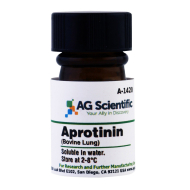Initially named "kallikrein inactivator, Aprotinin was first isolated from cow parotid glands in 1930. As a pancreatic enzyme inhibitor, it was initially used in the treatment for acute pancreatitis, a condition in which the destruction of the gland by its own enzymes is thought to be part of the pathogenesis.
Initially named "kallikrein inactivator, Aprotinin was first isolated from cow parotid glands in 1930. As a pancreatic enzyme inhibitor, it was initially used in the treatment for acute pancreatitis, a condition in which the destruction of the gland by its own enzymes is thought to be part of the pathogenesis. Bovine pancreatic trypsin inhibitor (BPTI) is one of the most thoroughly studied proteins in terms of structural biology, experimental and computational dynamics, mutagenesis, and the folding pathway. It was one of the earliest protein crystal structures solved in 1970 in the laboratory of Robert Huber and was the first protein to have its structure determined by NMR spectroscopy in the laboratory of Kurt Wuthrich at the ETH in Zurich in the early 1980s.What is Aprotinin?
 Aprotinin is a serine protease inhibitor that acts as a competitive, reversible inhibitor of proteolytic and esterolytic activity. Proteases play an important role in organ development, as well as tissue injury and repair, inflammation, and cancer.
The drug Aprotinin is derived from bovine lungs and is best known for its anti-fibrinolytic molecule, which inhibits proteolytic enzymes. Marketed under the name Trasylol, Aprotinin is most commonly used to reduce bleeding during complex surgeries.
Aprotinin is a serine protease inhibitor that acts as a competitive, reversible inhibitor of proteolytic and esterolytic activity. Proteases play an important role in organ development, as well as tissue injury and repair, inflammation, and cancer.
The drug Aprotinin is derived from bovine lungs and is best known for its anti-fibrinolytic molecule, which inhibits proteolytic enzymes. Marketed under the name Trasylol, Aprotinin is most commonly used to reduce bleeding during complex surgeries.
[Get your free Aprotinin inhibitor brochure here.]
What is the biochemistry of Aprotinin?
Aprotinin is a single-chain (monomeric) protein removed from bovine lung tissue. It has a molecular weight of 6,511 Daltons and is made up of 16 different amino acids arranged as a single 58-unit chain. The molecule is known for its stability due to the strength of the 3 disulfide bonds linking the 6 cysteine residues, exposing a C-terminal α-helix. This forms the active site which binds to trypsin and inhibits the enzymatic activity.Does it have any uses In Vitro?
- Small amounts of Aprotinin can be added to tubes of drawn blood to enable laboratory measurement of certain rapidly degraded proteins such as
- In minute quantities, Aprotinin can also be used to inhibit enzymes that destabilize mammalian cells in culture.
- Aprotinin can be labelled with fluorescein isothiocyanate. The conjugate retains its antiproteolytic and carbohydrate-binding propertiesand has been used as a fluorescent histochemical reagent for staining glycoconjugates (mucosubstances) that are rich in uronic or sialic acids.
- Additionally, human plasma contains proteins that may be used as biomarkers for proteomics diagnostics and prognosis. By mixing proteolytic inhibitors into blood samples, it helps to minimize the variability in results due to sample preparation and handling.
What are the recent application?
- The protection of proteins and enzymes during isolation/purification. Inhibition of protease activity increases the lifetime of cells in cell and tissue culture studies
- Purification of urokinase, trypsin, and chymotrypsin on immobilized Aprotinin
- Quantification of kallikrein activity in mixtures of esterases and proteases
- Controlled degradation of substrates by avoiding nonspecific proteolysis in clinical chemical tests
- Aprotinin as a model protein in protein-folding studies
- Molecular weight marker in SDS-polyacrylamide gel electrophoresis
Is there any current research on Aprotinin?
- Aprotinin, transfusions, and kidney injury in neonates and infants undergoing cardiac surgery M. Bojan1*, S. Vicca2, C. Boulat 3, S. Gioanni 1 and P. Pouard1 J. Anaesth.,May 2012; 108: 830 - 837.
- Aprotinin and pediatric heart surgery: children are not small adults. R A Jonas. Journal of Generic Medicines: The Business Journal for the Generic Medicines Sector,Apr 2011; 8: 76 - 80.

